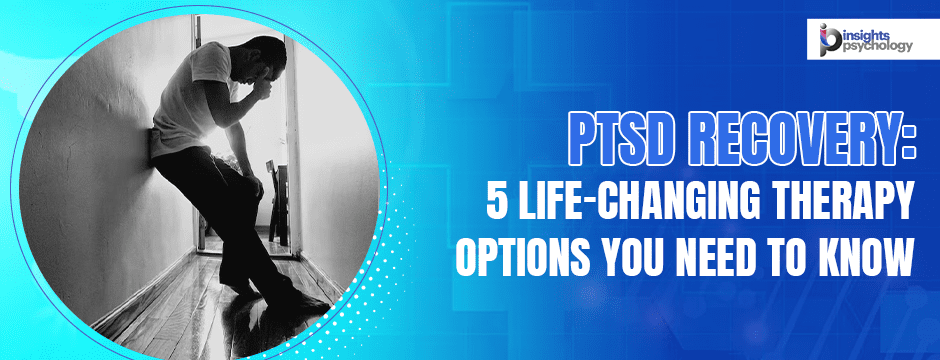Let’s be honest — living with PTSD is exhausting.
You’re tired of feeling on edge. Tired of the nightmares, the flashbacks, the racing heart that seems to come out of nowhere. You may have tried to “just move on,” but nothing sticks. If you’re here, chances are you’ve been searching for something more — something that works.
At Insights Psychology, we work with people every single day who’ve felt what you’re feeling. People who doubted they could ever feel “normal” again. But guess what? They’re now living fuller, calmer lives — not because they erased the past, but because they found the right path forward.
This isn’t a generic list. These are five powerful therapy options that have helped real people take back their lives. If you’re struggling with PTSD, one of these might be the lifeline you’ve been looking for.
1. EMDR: A Quiet Breakthrough for Loud Memories
You know those memories that keep looping in your mind like a bad movie? The ones that hit out of nowhere and leave you frozen?
That’s where EMDR comes in.
Short for Eye Movement Desensitization and Reprocessing, EMDR is a unique approach that helps your brain reprocess traumatic experiences in a way that finally sticks. It doesn’t involve reliving the trauma over and over. Instead, with the help of specific guided movements (like tracking the therapist’s fingers or tapping), your brain is gently guided to file those memories away properly — so they no longer run the show.
Why it works:
Trauma gets “stuck” in the brain. EMDR helps unstick it — not by erasing the memory, but by reducing the emotional weight it carries.
Who it helps:
Survivors of abuse, military veterans, accident victims, and even people with long-buried childhood trauma have found relief through EMDR.
At Insights Psychology, our trauma-trained EMDR specialists offer a safe, judgment-free space to explore this therapy. Curious if it’s right for you? Reach out for a no-pressure conversation.
2. CBT: Rebuilding Your Thoughts From the Inside Out
If you’ve ever caught yourself thinking, “It was my fault,” or “I’ll never be safe again,” you’re not alone.
Trauma has a way of rewriting our internal script. Cognitive Behavioral Therapy (CBT) helps you challenge those distorted thoughts and replace them with healthier, more accurate ones. Over time, you begin to see yourself — and your world — through a clearer, more compassionate lens.
What it looks like in real life:
Let’s say you feel anxious in crowded places because of something that happened years ago. CBT helps you explore why your brain is sending that danger signal, and teaches you how to respond differently — with tools you can actually use.
Why it’s a favorite:
CBT is one of the most researched and proven treatments for PTSD. And the best part? It’s practical. You’ll walk away from sessions with strategies you can apply immediately.
We offer trauma-informed CBT both in-person and online. Whether you need flexibility, structure, or just someone to help you through the hard days — we’ve got you covered.
3. Somatic Therapy: Because Your Body Feels It Too
Ever get triggered without knowing why? Maybe your chest tightens, or your stomach drops — even though nothing “bad” is happening in the moment.
That’s your nervous system holding on to trauma.
Somatic therapy isn’t about talking. It’s about listening — to your body. This approach focuses on physical sensations, muscle tension, breath, and movement to help release stored trauma energy that traditional therapy might miss.
What clients say:
“I didn’t even realize I was holding my breath all the time until my therapist pointed it out. Once I learned to tune into my body, it was like something finally clicked.”
Who benefits the most:
People with chronic anxiety, dissociation, or who have a hard time putting their trauma into words often find somatic work deeply healing.
Our practitioners are trained in trauma-sensitive somatic methods that help clients reconnect with their bodies gently and safely. No pressure. No forcing. Just healing at your pace.
4. IFS: Understanding the Different Parts of You
Have you ever felt like part of you wants to heal… but another part keeps sabotaging it?
That’s not unusual. Internal Family Systems (IFS) therapy sees the mind as a collection of different “parts,” each trying to help in its own way. Some parts carry the wounds. Others try to protect you — even if it comes out as anxiety, anger, or shutting down.
IFS helps you get to know those parts with compassion, instead of trying to push them away. And as strange as it sounds at first, it’s one of the most transformative tools we’ve seen.
Real talk:
It’s not about labeling yourself as “broken.” It’s about recognizing that every part of you developed for a reason — and now, together, you can write a new chapter.
Why it matters:
When people feel fragmented or like they’re constantly at war with themselves, IFS provides a path back to wholeness.
Our IFS-trained therapists at Insights Psychology help guide you through this inner landscape so you can find more harmony — and a deeper sense of self.
5. Group Therapy: You’re Not Alone (Even If It Feels Like It)
PTSD can be one of the loneliest experiences in the world. You may feel like no one else gets it — not your friends, not your family, not even yourself some days.
But imagine walking into a room (in-person or virtual) where every single person does get it. They’ve been there. They’re still going through it. And they’re showing up — just like you are.
That’s the power of group therapy.
Why it works:
When you speak your truth in a room where it’s heard — and understood — something shifts, shame loosens its grip. Isolation begins to lift. You realize: I’m not broken. I’m human.
Tailored groups we offer:
- Survivors of abuse
- Veterans and first responders
- Individuals recovering from medical trauma
- Caregivers navigating second-hand PTSD
Interested in joining a group that actually feels supportive? Let’s find the right one for you. Spaces are limited, but the impact lasts.
How to Choose the Right Therapy
There’s no “one-size-fits-all” when it comes to trauma recovery.
Some people find EMDR to be life-changing. Others need the structure of CBT, or the body-based calm of somatic therapy. Still others begin to thrive once they connect with a group or dive into IFS.
You don’t need to have it all figured out. That’s our job — to help you explore what fits.
At Insights Psychology, we don’t just plug you into a system. We listen. We learn about you. And together, we craft a healing plan that makes sense for where you are right now.
Final Words: This Is Your Sign
If you’ve read this far, chances are something in you is ready for change. And no — you don’t need to be “rock bottom” to ask for help. Wanting peace, clarity, and freedom is enough.
You deserve that.
Here’s how we can help:
- Schedule a free, confidential consultation
- Get matched with a therapist who specializes in trauma
- Explore healing options without pressure or judgment
You’re not too damaged. You’re not too late. And you’re certainly not alone.
You’re just getting started — and we’re honored to walk with you.
Key Questions About PTSD Recovery and Effective Treatment Options
1. What are the first steps to recovering from PTSD?
The first steps to PTSD recovery often involve acknowledging symptoms and seeking professional help. A licensed psychologist for PTSD can assess your needs and recommend a personalized PTSD recovery program. Initial treatment may include therapy, medication, or both. It’s important to establish a safe environment, learn coping tools, and understand the stages of recovery from PTSD to build a strong foundation for long-term healing.
2. Can PTSD ever go away completely or is it lifelong?
While PTSD may not always disappear entirely, many people experience significant improvement or full remission with consistent treatment. Engaging in an evidence-based PTSD recovery program and receiving support from a qualified psychologist for PTSD can reduce symptoms dramatically. Recovery outcomes vary, but with the right care, including intense therapy for PTSD, many regain control over their lives and function normally over time.
3. How do I support a loved one going through PTSD recovery?
Supporting someone in PTSD recovery requires patience, empathy, and awareness. Encourage them to seek PTSD help near me or connect with a psychologist for PTSD. Listen without judgment, avoid pushing them to “move on,” and educate yourself on the stages of recovery from PTSD. Joining support groups and practicing open communication can help your loved one feel validated and less isolated throughout their healing journey.
4. How do trauma triggers affect PTSD recovery progress?
Trauma triggers can temporarily disrupt PTSD recovery, causing flashbacks, anxiety, or emotional distress. Understanding these triggers is key to progressing through the stages of recovery from PTSD. A structured PTSD recovery program teaches coping techniques to manage reactions. Triggers don’t mean failure—they’re part of healing. With time and guidance from a skilled psychologist for PTSD, patients can reduce their impact and regain stability.
5. Can exercise and mindfulness speed up PTSD recovery?
Yes, both exercise and awareness can appreciably impact PTSD recovery. Regular physical activity reduces stress hormones and improves mood, while mindfulness helps ground individuals in the present moment. These practices often complement a formal PTSD recovery program or intense therapy for PTSD by improving emotional regulation. Many psychologists for PTSD incorporate them into treatment plans to support progress through the stages of recovery from PTSD.
Think PTSD symptoms are complex? You might be surprised at what ADHD in adults can look like—some signs fly completely under the radar.

